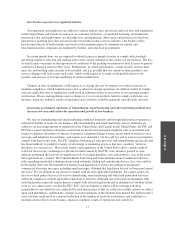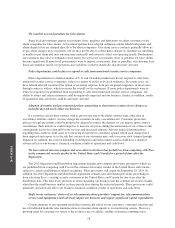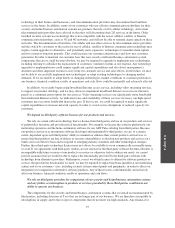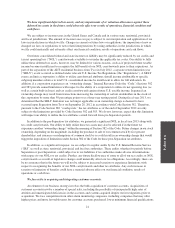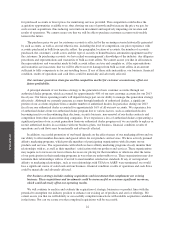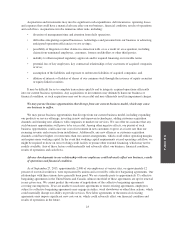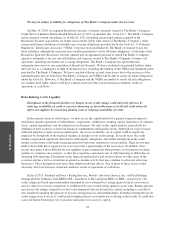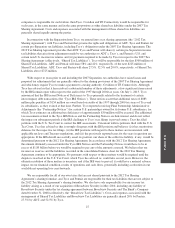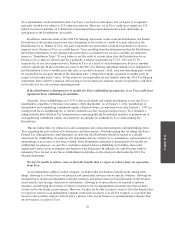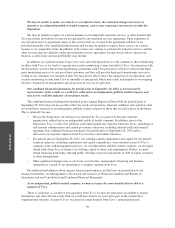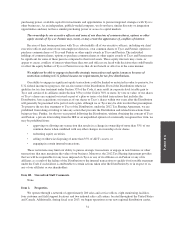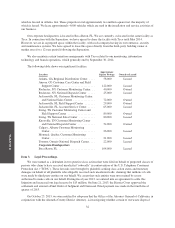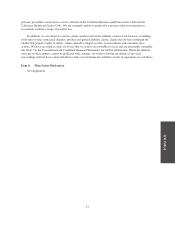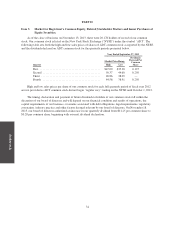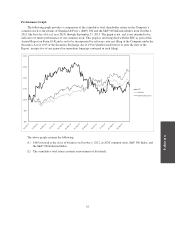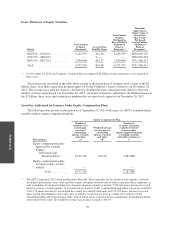ADT 2013 Annual Report Download - page 90
Download and view the complete annual report
Please find page 90 of the 2013 ADT annual report below. You can navigate through the pages in the report by either clicking on the pages listed below, or by using the keyword search tool below to find specific information within the annual report.
FORM 10-K
• increase our vulnerability to adverse economic and industry conditions;
• limit our flexibility in planning for, or reacting to, changes in our business and the markets in which we
operate;
• restrict our ability to introduce new technologies or exploit business opportunities;
• make it more difficult for us to satisfy our payment obligations with respect to our outstanding
indebtedness; and
• increase the difficulty and/or cost to us of refinancing our indebtedness.
Risks Relating to Our Common Stock
Provisions in our certificate of incorporation and by-laws and of Delaware law may prevent or delay an
acquisition of our company, which could decrease the trading price of our common stock.
Our certificate of incorporation and by-laws and Delaware law contain provisions that are intended to deter
coercive takeover practices and inadequate takeover bids by making such practices or bids more expensive to the
acquiror and to encourage prospective acquirors to negotiate with our board of directors rather than to attempt a
hostile takeover. These provisions include rules regarding how stockholders may present proposals or nominate
directors for election at stockholder meetings and the right of our board of directors to issue preferred stock
without stockholder approval.
Delaware law also imposes some restrictions on mergers and other business combinations between any
holder of 15% or more of our outstanding common stock and us. We believe these provisions protect our
stockholders from coercive or otherwise unfair takeover tactics by requiring potential acquirors to negotiate with
our board of directors and by providing our board of directors with more time to assess any acquisition proposal.
These provisions are not intended to make us immune from takeovers. However, these provisions apply even if
the offer may be considered beneficial by some stockholders and could delay or prevent an acquisition that our
board of directors determines is not in the best interests of our company and our stockholders. Accordingly, in
the event that our board of directors determines that a potential business combination transaction is not in the best
interests of our company and our stockholders but certain stockholders believe that such a transaction would be
beneficial to our company and our stockholders, such stockholders may elect to sell their shares in our company
and the trading price of our common stock could decrease.
Risks Relating to our Separation from Tyco
We share responsibility for certain income tax liabilities of ADT, Tyco and Pentair Ltd., formerly Tyco
Flow Control International Ltd. (“Pentair”) for tax periods prior to and including September 28, 2012,
and such liabilities may include a portion of Tyco’s obligations under its tax sharing agreement with
Covidien Ltd. (“Covidien”) and TE Connectivity Ltd. (“TE Connectivity”) for tax liabilities for tax
periods prior to and including June 29, 2007.
In connection with the 2007 distributions of Covidien and TE Connectivity by Tyco (the “2007
Separation”), Tyco entered into a tax sharing agreement (the “2007 Tax Sharing Agreement”) that governs the
rights and obligations of each party with respect to certain pre-2007 Separation tax liabilities and certain tax
liabilities arising in connection with the 2007 Separation. More specifically, Tyco, Covidien and TE Connectivity
share 27%, 42% and 31%, respectively, of income tax liabilities that arise from adjustments made by tax
authorities to Tyco’s, Covidien’s and TE Connectivity’s U.S. and certain non-U.S. income tax returns and certain
taxes attributable to internal transactions undertaken in anticipation of the 2007 Separation. In addition, in the
event the 2007 Separation or certain related transactions is determined to be taxable as a result of actions taken
after the 2007 Separation by Tyco, Covidien or TE Connectivity, the party responsible for such failure would be
responsible for all taxes imposed on Tyco, Covidien or TE Connectivity as a result thereof. If none of the
26



